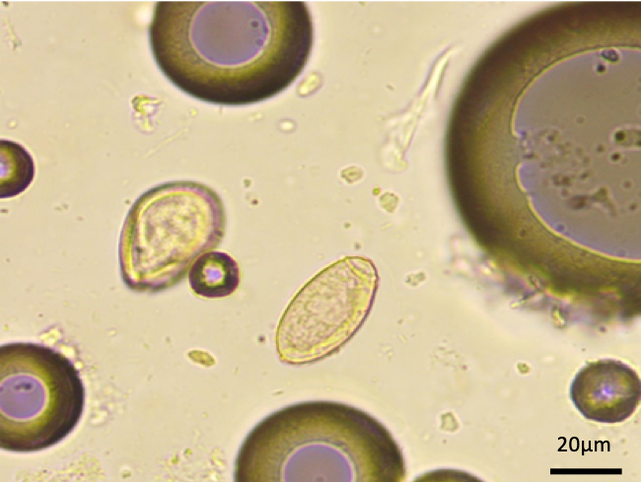Indiana Newcomer!A 3-year-old, male, intact domestic shorthair cat showed signs of anorexia, vomiting, drooling, tachypnea, ataxia, and twitching. The cat tested positive for Feline Infectious Peritonitis. He did not respond to treatment and died due to Cardiopulmonary arrest (CPA). Necropsy was performed at the Indiana Animal Disease Diagnostic Laboratory, Purdue University. This parasite egg shown in the image was an incidental finding on centrifugal fecal flotation performed using Sheather’s solution. Image 1: Ova found on fecal examination (400x magnification) This month’s case was a contribution of Dr. Vishnu Manikantan, Purdue University. Opisthorchids are trematodes residing in the gall bladder and bile duct of many vertebrates. The eggs (22-35µm X 11-19 µm) are thin-shelled and operculated with a yellowish-brown color. The presence of a prominent lip around the rim of the operculum and the adjacent shell is a distinguishing feature of these eggs. In cats, Metorchis conjunctus, M. albidus, and Amphimerus pseudofelineus are the Opisthorchids reported from parts of the United States and Canada. Parasites belonging to the family Opisthorchiidae have an indirect life cycle involving two intermediate hosts- mollusks and freshwater fish. Opisthorchid infection is not known to create severe health effects in the definitive host. Nevertheless, there have been occasional reports of clinically significant liver damage. Eggs can be recovered using centrifugal fecal flotation, but sedimentation tests are preferred. |
Archives
July 2024
Have feedback on the cases or a special case you would like to share? Please email us ([email protected]). We will appropriately credit all submittors for any cases and photos provided.
|

